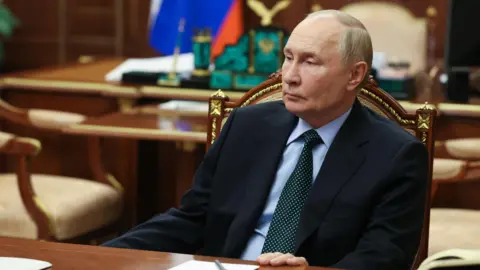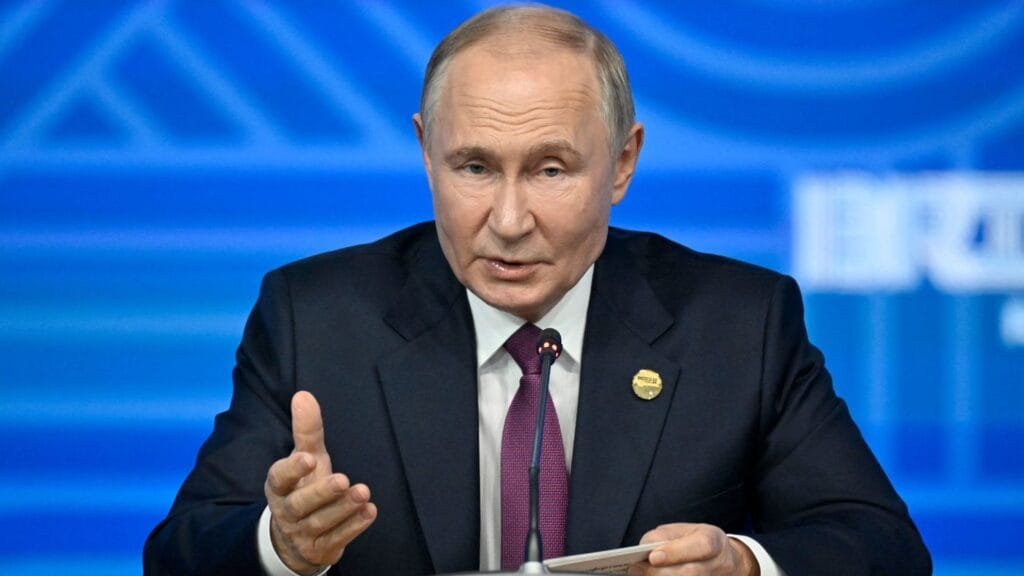Key Highlights:
When the war between Russia and Ukraine became over 1,000 days old, a new development had begun as President Vladimir Putin issued a decree expanding on Russia’s nuclear doctrine. This was now in the wake of intensified hostilities, increased Western support to Ukraine, and protracted humanitarian crisis. The world, which initially held its breath since the beginning of the conflict, now also has an added layer of complexity with Putin’s decree.
Putin’s New Nuclear Policy
On 19 November 2024, Vladimir Putin approved a new version of the nuclear doctrine providing for much more permissive use of nuclear weapons. The policy change establishes that Russia has the right to use nuclear weapons in response to conventional strikes if these are carried out in conjunction with nuclear-weapon states. The decision largely follows the growth of Western support for Ukraine, including the provision of some very long-range missiles.

The decree clearly states that nuclear powers’ attacks for their non-nuclear allies are directly aimed at nuclear threats and calls for a nuclear retaliation if required. This increase indicates Russia is prepared to escalate its measures of defense at all costs against what it perceives to be existential threats.
U.S. Enables Long-Range Missile for Ukraine
In a related development, the United States has legally allowed Ukraine to use long-range missiles against strategic Russian targets. The policy change, using systems such as Army Tactical Missile System (ATACMS), is targeted at checking Russia’s military strides. According to Ukraine, this can reclaim their territories; Moscow termed it a dangerous provocation.

U.S. Support in Response to Russia
The Kremlin had vehemently objected to the U.S. decision to arm Ukraine with long-range missiles in what it described as an act of direct aggression. Dmitry Peskov, the Kremlin spokesperson, cautioned that “any strikes on Russian territory, especially those launched with the assistance of nuclear-armed partners, will have devastating consequences.” The revised nuclear doctrine strengthens this position as it also escalates the stakes involved in the conflict.
Ukraine’s Stand on the Conflict
Ukrainian President Volodymyr Zelenskyy remains defiant and has so far urged his allies to continue fueling military and financial support for Ukraine. The Ukrainian military recently carried out its maiden long-range missile strikes on strategic infrastructure in Russia, marking a new strategic turn in the conflict. Such moves have exemplified Kyiv’s resolve to protect its sovereignty and territorial integrity.
International Response to the Deterioration of the Situation
The international community expressed deep concern over the latest developments. NATO Secretary-General Jens Stoltenberg criticized Russia’s nuclear rhetoric, terming it reckless and destabilizing. However, he also emphasized that NATO remains committed to preventing further escalation while supporting Ukraine’s defense efforts.
Meanwhile, calls for peace negotiations have intensified as several countries urge both parties to return to the table for dialogue. Despite this, significant gaps in the postures of Russia and Ukraine imply mutual distrust goes a long way towards inhibiting real progress.
Humanitarian Effect of the Protracted Conflict
The 1,000-day milestone also underscores the devastating humanitarian toll of the war. Millions of Ukrainians have been displaced, and civilian casualties continue to rise amid intensified Russian attacks. Recent reports of chemical weapons use by Russian forces have added to the atrocities, drawing condemnation from international watchdogs.
Implications of Putin’s Nuclear Doctrine Expansion
The expansion of Russia’s nuclear doctrine has profound implications for global security:
- Heightened Risk of Escalation: Lowering the threshold for nuclear weapon use increases the likelihood of miscalculation and catastrophic consequences.
- Strained International Relations: The move challenges existing norms around nuclear deterrence and could strain Russia’s relations with key global players.
- Impact on Peace Efforts: The threat of nuclear escalation complicates efforts to mediate a resolution to the conflict, potentially prolonging hostilities.
Path Forward: Can Peace Prevail?
There is, yet, a dimming of hope for diplomacy despite the bleak appearances. Russia and Ukraine have signaled a conditional openness to peace talks. But trust deficits and conflicting demands such as Ukraine’s insistence on withdrawal by Russia, and Russia’s demand that Ukraine demilitarize, serve as significant impediments to negotiated settlement.
It is at this point that the role of the international community is pivotal. Ideal mediation along with international pressure on both the sides to prioritize dialogue rather than conflict should open the door for de-escalation.
Conclusion
Now, 1,000 days into the Russia-Ukraine war, the conflict is merely continuing to rage on unabated. Russia’s nuclear doctrine expansion, coupled with increasing Western support for Ukraine, escalates the match of international security stakes. More than ever before, it seems that what the world needs most now is urgent dialogue towards peaceful resolution, but neither may come easily.
For Latest News Updates Click Here
